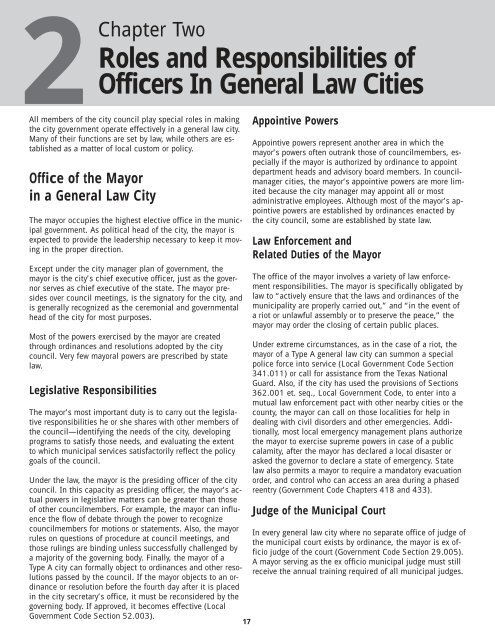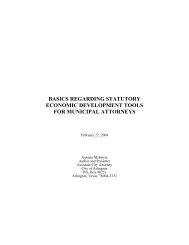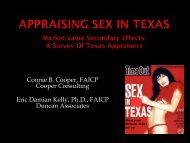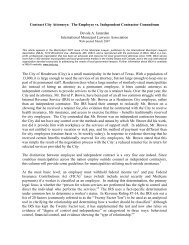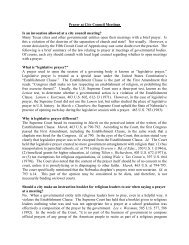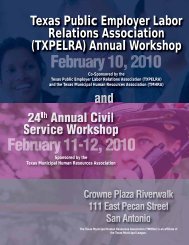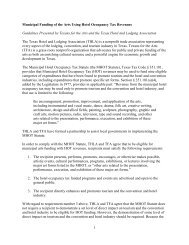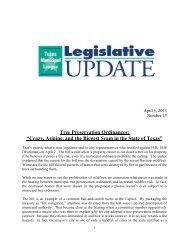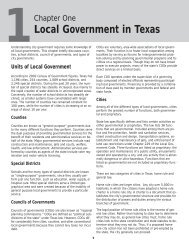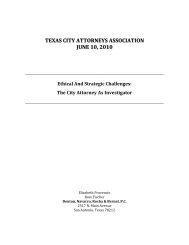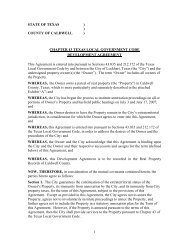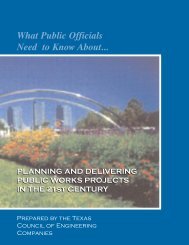Roles and Responsibilities of Officers In General Law Cities - Texas ...
Roles and Responsibilities of Officers In General Law Cities - Texas ...
Roles and Responsibilities of Officers In General Law Cities - Texas ...
You also want an ePaper? Increase the reach of your titles
YUMPU automatically turns print PDFs into web optimized ePapers that Google loves.
general law municipality operating under the commissionform <strong>of</strong> government, the mayor’s term <strong>of</strong> <strong>of</strong>fice is two years(Local Government Code Section 24.023).<strong>In</strong> any city, the term <strong>of</strong> <strong>of</strong>fice <strong>of</strong> members <strong>of</strong> the governingbody can be extended by ordinance to three years or fouryears upon approval <strong>of</strong> a majority <strong>of</strong> the voters voting at anelection on the question (<strong>Texas</strong> Constitution, Article XI, Section11).VacanciesWhen the mayor is temporarily unable to perform his or herduties because <strong>of</strong> illness, out-<strong>of</strong>-town travel, or similar reasons,the mayor pro tem assumes the responsibilities <strong>of</strong> the<strong>of</strong>fice on an interim basis (please see discussion <strong>of</strong> mayorpro tem on the next page). But if a permanent vacancy occursin the <strong>of</strong>fice <strong>of</strong> mayor as a result <strong>of</strong> death, disability,resignation, or some other reason, the vacancy must befilled according to prescribed procedures.<strong>In</strong> a Type B general law city operating under the aldermanicform <strong>of</strong> government, a mayoral vacancy is always filled byappointment by the board <strong>of</strong> aldermen. The term <strong>of</strong> the personappointed expires at the same time that the term <strong>of</strong> theperson who vacated the <strong>of</strong>fice would have expired if he orshe had remained in <strong>of</strong>fice (Local Government Code Section23.002).<strong>In</strong> a Type A general law city operating under the aldermanicform <strong>of</strong> government, the vacancy can be filled either by appointment<strong>of</strong> the city council or by a special election if themayor’s <strong>of</strong>fice is the only one vacant. However, if anothervacancy exists on the board <strong>of</strong> aldermen when the mayor’s<strong>of</strong>fice is vacant, both vacancies must be filled at a specialelection. When a vacancy is filled by appointment, the term<strong>of</strong> the person appointed expires at the next general municipalelection. When a vacancy is filled by special election,the person elected serves out the remainder <strong>of</strong> the unexpiredterm <strong>of</strong> the vacancy being filled (Local GovernmentCode Section 22.010).<strong>In</strong> a Type C city operating under the commission form <strong>of</strong>government, a vacancy in the <strong>of</strong>fice <strong>of</strong> mayor must be filledby appointment by the two remaining members <strong>of</strong> the board<strong>of</strong> commissioners. But if there are two vacancies on theboard <strong>of</strong> commissioners, they must be filled at a specialelection called by the county judge, <strong>and</strong> the persons electedserve out the remainder <strong>of</strong> the unexpired terms <strong>of</strong> the vacanciesbeing filled (Local Government Code Section 24.026).If the terms <strong>of</strong> <strong>of</strong>fice in a city have been changed to three orfour years, appointment is no longer an option. Any vacancymust be filled by special election (<strong>Texas</strong> Constitution, ArticleXI, Section 11).Absences from Council Meetings<strong>In</strong> a Type A general law city, the mayor is a “member” <strong>of</strong> thecity council (Local Government Code Section 22.031).Under Section 22.041 <strong>of</strong> the Local Government Code, “if amember <strong>of</strong> the governing body is absent for three regularconsecutive meetings, the member’s <strong>of</strong>fice is considered vacantunless the member is sick or has first obtained a leave<strong>of</strong> absence at a regular meeting.”RemovalProcedures for removing the mayor or a councilmemberfrom <strong>of</strong>fice are set forth in Section 21.002 <strong>of</strong> the Local GovernmentCode. Under the law, a member <strong>of</strong> the governingbody is subject to removal for incompetence, <strong>of</strong>ficial misconduct,or intoxication. A petition for removal must be filedwith a district court, may be filed by any resident <strong>of</strong> the city,<strong>and</strong> must state the alleged grounds for removal. The judgemay decide to issue a citation to the member in question ormay decline to do so. If the judge declines to issue a citation,the petition is dismissed at the cost <strong>of</strong> the petitioner. Ifthe judge issues a citation to the member, the member mustappear before the judge to answer the petition <strong>and</strong> may requesta trial by jury. The petitioner must execute a bond inan amount fixed by the judge. The bond shall be used topay damages <strong>and</strong> costs to the member if the allegedgrounds for removal are found to be insufficient or untrue.The final judgment on the issue may be appealed by eitherparty. Conviction <strong>of</strong> the member for any felony or <strong>of</strong>ficialmisconduct will result in immediate removal, <strong>and</strong> the removedmember is ineligible for reelection for two years.There is no such thing in a general law city as “recall,”which is a procedure citizens can use to vote an incumbentmayor or councilmember out <strong>of</strong> <strong>of</strong>fice before the expiration<strong>of</strong> his or her term. The power <strong>of</strong> recall is limited to voters inhome rule cities in which the charter provides for the procedure.Compensation<strong>In</strong> cities operating under the commission form <strong>of</strong> government,the board <strong>of</strong> commissioners may, by ordinance, fix themayor’s compensation at a maximum <strong>of</strong> $5 for each regularcommission meeting <strong>and</strong> $3 for each special meeting. Alternatively,the board <strong>of</strong> commissioners in a city <strong>of</strong> less than2,000 can pay the mayor a salary <strong>of</strong> up to $600 per year,while the board <strong>of</strong> commissioners in a city <strong>of</strong> 2,000 orgreater population can pay the mayor up to $1,200 per year(Local Government Code Section 141.003).<strong>In</strong> general law cities operating under the aldermanic form <strong>of</strong>government, no maximum salary amount is fixed for themayor. The governing body can set the mayor’s compensationat any level it chooses (Local Government Code Sections141.001 <strong>and</strong> 141.002).19
Only one limitation exists: The mayor cannot receive a payincrease that was approved during the term for which he orshe is elected. Such increase will become effective onlyafter the next general municipal election at which the <strong>of</strong>fice<strong>of</strong> mayor is filled (Local Government Code Section141.001).Expense ReimbursementIt is commonplace for the city to reimburse the mayor fortravel <strong>and</strong> other expenses incurred on <strong>of</strong>ficial city businesstrips, such as meetings <strong>of</strong> the <strong>Texas</strong> Municipal League <strong>and</strong>similar organizations. Most travel policies are established byordinance or resolution.Office <strong>of</strong> Mayor Pro TemThe mayor pro tempore is a member <strong>of</strong> the council who performsthe mayor’s duties during the mayor’s incapacity orabsence. The mayor pro tem is selected by majority vote <strong>of</strong>the council from among its own membership. The mayor protem’s term is one year. The mayor pro tem retains the rightto vote on all matters before the council (<strong>and</strong> not just tobreak a tie) while performing the duties <strong>of</strong> the mayor (LocalGovernment Code Section 22.037 <strong>and</strong> 23.027).Office <strong>of</strong> CouncilmemberCouncilmembers are the city’s legislators. Their primaryduty is policymaking, which includes identifying the needs<strong>of</strong> local residents, formulating programs to meet the changingrequirements <strong>of</strong> the community, <strong>and</strong> measuring the effectiveness<strong>of</strong> ongoing municipal services.Unless restricted by state law, each councilmember is entitledto vote or abstain on every question decided at a councilmeeting, <strong>and</strong> has full parliamentary privileges in councilmeetings—including the right to speak <strong>and</strong> make motionswhen recognized by the chair <strong>and</strong> the right to introduce newordinances <strong>and</strong> amendments to existing ones.Though foremost in importance, lawmaking is just one <strong>of</strong>many functions councilmembers perform. They also wearseveral other hats, which one writer describes as follows:H Regulator—The council exercises regulatory powers overthe conduct <strong>and</strong> property <strong>of</strong> its citizens. It has thepower to declare certain conduct to be criminal, to requirethat certain businesses <strong>and</strong> activities be licensed,<strong>and</strong> to tell property owners how <strong>and</strong> for what purposesthey may use their property.H Financier—The council may levy taxes, assess fees <strong>and</strong>charges, <strong>and</strong> sell bonds in order to finance the manyfunctions <strong>of</strong> the city government. The council also hasHHto budget the expenditure <strong>of</strong> the city’s funds, <strong>and</strong> thenexplain to the people why municipal government is abargain compared to the price <strong>of</strong> rampant crime, fires,disease, <strong>and</strong> all <strong>of</strong> the other problems that would flourishwithout proper city services.Employer—The council is responsible for all <strong>of</strong> thecity’s employees, <strong>and</strong> must see that they are adequatelypaid <strong>and</strong> provided with decent working conditions <strong>and</strong>fringe benefits.Buyer—The council is one <strong>of</strong> the biggest purchasers inthe community, <strong>and</strong> must see to it that the city gets thebest value possible for dollars spent.Even this is not a complete description <strong>of</strong> all the challengesthat confront councilmembers. Former U.S. Senator PaulDouglas, who served as a city councilmember early in hiscareer, described how he had been called on by his constituentsto help kill rats <strong>and</strong> mice <strong>and</strong> exterminate bedbugs.He also recalled that he was once telephoned by amother who said her little daughter had a chance to enter atap-dancing competition at a neighborhood theater, but didn’tknow how to tap dance. Douglas went to the mother’shome <strong>and</strong>, with the aid <strong>of</strong> a harmonica, gave the tot a dancinglesson.These illustrations simply indicate how varied the councilmember’sexperience on the job may be. The real task isin providing leadership <strong>and</strong> direction for the city, in decidingwhat needs to be done, <strong>and</strong> helping plan what the city willbe for future generations.Qualifications<strong>In</strong> general law cities, the qualifications for the <strong>of</strong>fice <strong>of</strong>councilmember are:( 1 ) Be a United States citizen;( 2 ) Have been a resident <strong>of</strong> <strong>Texas</strong> for at least 12months as <strong>of</strong> the deadline for filing for the <strong>of</strong>fice;( 3 ) Have resided in the city for at least 6 monthspreceding the deadline for filing for <strong>of</strong>fice;( 4 ) Have a current voter registration certificate;( 5 ) Be 18 years <strong>of</strong> age or older upon thecommencement <strong>of</strong> the term to be filled at theelection;( 6 ) Not have been convicted <strong>of</strong> a felony for which he orshe has not been pardoned or otherwise releasedfrom the resulting disabilities; <strong>and</strong>20
( 7 ) Not have been deemed mentally incompetent by afinal judgment <strong>of</strong> a court.(Election Code Section 141.001; Local Government CodeSection 22.032 <strong>and</strong> 23.024).One additional requirement: If a Type A general law city hasbeen divided into wards, every council c<strong>and</strong>idate must, atthe time <strong>of</strong> his or her election, be a resident <strong>of</strong> the ward heor she proposes to represent if elected. (Local GovernmentCode Section 22.032).Terms <strong>of</strong> Office<strong>In</strong> a Type B general law city, the term <strong>of</strong> <strong>of</strong>fice for aldermenis one year, unless the board <strong>of</strong> aldermen has enacted an ordinanceproviding a two-year term for the mayor <strong>and</strong> twoyearoverlapping terms for aldermen (Local GovernmentCode Section 23.026). <strong>In</strong> a Type A general law city, theterm <strong>of</strong> <strong>of</strong>fice for members <strong>of</strong> the city council is two years(overlapping terms) (Local Government Code Section22.035).<strong>In</strong> any city, the term <strong>of</strong> <strong>of</strong>fice <strong>of</strong> members <strong>of</strong> the governingbody can be extended by ordinance to three years or fouryears upon approval <strong>of</strong> a majority <strong>of</strong> the voters voting at anelection called on the question (<strong>Texas</strong> Constitution, ArticleXI, Section 11).Vacancies<strong>In</strong> a Type B general law city operating under the aldermanicform <strong>of</strong> government, vacancies on the board <strong>of</strong> aldermen—whatever the number <strong>of</strong> vacancies—are always filled by appointmentby the remaining members <strong>of</strong> the board (LocalGovernment Code Section 23.002).<strong>In</strong> a Type A general law city operating under the aldermanicform <strong>of</strong> government, when there is only one vacancy on thegoverning body, the vacancy can be filled either by appointment<strong>of</strong> the city council or by means <strong>of</strong> a special election.However, if there are two or more vacancies on the governingbody, such vacancies must be filled at a special election(Local Government Code Section 22.010).<strong>In</strong> a city operating under the commission form <strong>of</strong> government(a Type C city), a single vacancy must be filled by appointmentby the two remaining members <strong>of</strong> the board <strong>of</strong>commissioners. But if there are two vacancies on the board,they must be filled at a special election called by the countyjudge (Local Government Code Section 24.026).AbsencesUnder Sections 22.038 <strong>and</strong> 22.041 <strong>of</strong> the Local GovernmentCode, an illness <strong>of</strong> an alderman or someone in his orher family is the only reason for absence from council meetingsin a Type A general law city. Unexcused absences arepunishable by a fine <strong>of</strong> $3 for each council meeting missed.If an alderman is absent for three consecutive regular meetings—unlessbecause <strong>of</strong> sickness or without first having obtaineda leave <strong>of</strong> absence at a regular meeting—his or her<strong>of</strong>fice shall be vacant.There is no law applicable to absences by aldermen in TypeB cities or members <strong>of</strong> the board <strong>of</strong> commissioners in municipalitiesoperating under the commission form <strong>of</strong> government(Type C cities). However, in cities over 500population, which operate under the commission form <strong>of</strong>government, Section 51.051 <strong>of</strong> the Local Government Code(relating to the application <strong>of</strong> laws to cities with the commissionform) would probably make Sections 22.038 <strong>and</strong>22.041 <strong>of</strong> the Local Government Code (relating to absences)applicable to such cities. Type B cities should contacttheir local legal counsel or the TML Legal Departmentto discuss this issue, as state law is unclear.RemovalProcedures for removing a councilmember from <strong>of</strong>fice in ageneral law city are the same as for the mayor.Compensation<strong>In</strong> cities operating under the commission form <strong>of</strong> government,the board <strong>of</strong> commissioners may, by ordinance, fixcommissioners’ compensation at a maximum <strong>of</strong> $5 for eachregular commission meeting <strong>and</strong> $3 for each special meeting.Alternatively, the board <strong>of</strong> commissioners in a city <strong>of</strong>2,000 or greater population can provide for paying commissionersup to $600 per year (Local Government Code Section141.003).<strong>In</strong> Type A <strong>and</strong> B general law cities operating under the aldermanicform <strong>of</strong> government, no maximum salary amountis fixed for aldermen. Therefore, the governing body can setcouncilmembers’ compensation at any level it decides. Onlyone limitation exists: An alderman cannot receive the benefit<strong>of</strong> a pay increase adopted during the term for which he orshe is elected. Such increase will become effective onlyafter the next general municipal election at which the <strong>of</strong>fice<strong>of</strong> the alderman serving at the time <strong>of</strong> the pay increase isfilled (Local Government Code Chapter 141).21
Expense ReimbursementIt is commonplace for cities to reimburse councilmembersfor travel <strong>and</strong> other expenses incurred on <strong>of</strong>ficial citybusiness trips to meetings <strong>of</strong> the <strong>Texas</strong> Municipal League,councils <strong>of</strong> government, <strong>and</strong> similar organizations. Mosttravel policies are established by ordinance or resolution.22


